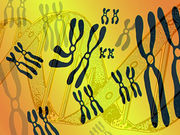For mutation carriers, age at diagnosis of first cancer predicts contralateral breast cancer risk
TUESDAY, Dec. 29, 2015 (HealthDay News) — BRCA1/2 mutation carriers have increased risk of contralateral breast cancer (CBC), with age at first diagnosis a significant predictor of CBC risk, according to a study published online Dec. 23 in the Journal of Clinical Oncology.
Alexandra J. van den Broek, from the Netherlands Cancer Institute in Amsterdam, and colleagues examined overall and age-specific estimates of CBC risk for young patients with breast cancer with or without BRCA1/2 mutations. Data were included for 6,294 patients with invasive breast cancer diagnosed under 50 years of age and treated between 1970 and 2003; participants were tested for the most prevalent BRCA1/2 mutations.
The researchers identified 578 CBCs in the study population after a median follow-up of 12.5 years. Compared with noncarriers, BRCA1 and BRCA2 mutation carriers had significantly increased CBC risk (hazard ratios, 3.31 and 2.17, respectively). The 10-year cumulative CBC risks were 21.1, 10.8, and 5.1 percent, respectively, for BRCA1 carriers, BRCA2 carriers, and noncarriers, respectively. In BRCA1/2 carriers only, age at diagnosis of first breast cancer was a significant predictor of CBC risk; the 10-year cumulative CBC risk was 23.9 percent in those diagnosed before age 41 years, compared with 12.6 percent for those aged 41 to 49 years (P = 0.02).
“Considering the available evidence, age-specific risk estimates should be included in counseling,” the authors write.
One author disclosed financial ties to Agendia NV.
Copyright © 2015 HealthDay. All rights reserved.








